If you’re dealing with closed comedones, you’re not alone. This type of acne is actually quite common.
So what can be done about it? Can Accutane help get rid of closed comedones? Or can closed comedones be treated with a less intense treatment option?
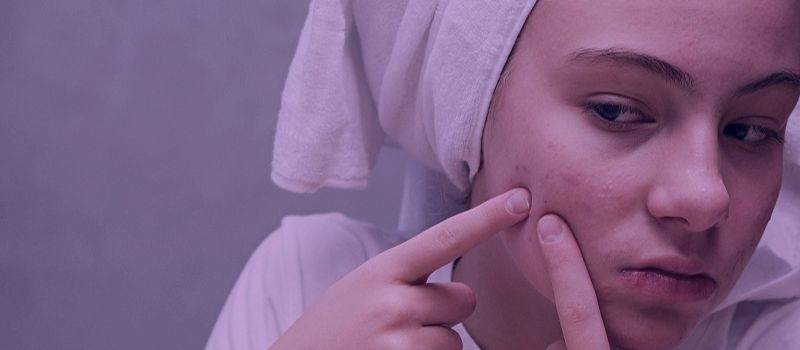
What Causes Closed Comedones?
While knowing how to treat closed comedones is important, it’s also essential to understand how and why they form.
Every hair on your body has a follicle (pore). A buildup of oil and dead skin cells, which we all have, can sometimes clog the pore.
When the pore becomes completely clogged, a closed comedone forms. They often start out painless, but they can turn into painful, red pimples if bacteria get in.
Closed comedones (whiteheads) are similar to open comedones (blackheads). Both are considered as grade I non-inflammatory acne, but they look different from one another.
Open comedones turn black when exposed to air, while a closed comedone remains “closed” because a thin layer of skin over the plug prevents it from opening up.
A few major causes of closed comedones include:
Oil-based Skincare & Makeup Products
Heavy, oil-based skincare and makeup products that clog the pores and prevent the normal sebum flow are the most common culprit of closed comedones.
The first step in treating closed comedones is to eliminate products that trigger them.
Go through the ingredient lists of products you are using and try to figure out which ones might be causing you an issue.
Overly Dehydrated Skin
Overly dehydrated skin is another common culprit of closed comedones. When the skin gets dehydrated from stripping products containing drying ingredients such as alcohol, it tends to overproduce sebum at an abnormal rate to compensate for the dryness.
Excessive Sebum Production
Excessive sebum production can be due to hormonal imbalances, and mainly occurs when the male group of hormones known as androgens are overactive and stimulate the oil-producing glands.
Accumulation of Dead Skin Cells
Accumulation of dead skin cells that don’t shed properly can get mixed up with hardened sebum inside the pore and be another addition to the formation of closed comedones.
Environmental Factors
Environmental factors such as pollution that accumulates on the skin and excessive sun exposure that alters the skin’s chemistry are some of the main causes of closed comedones.
Diet and Lifestyle
Food allergies and intolerance, as well as damaging lifestyle habits such as smoking, could also be the cause of closed comedones.
Does Accutane Get Rid of Closed Comedones?
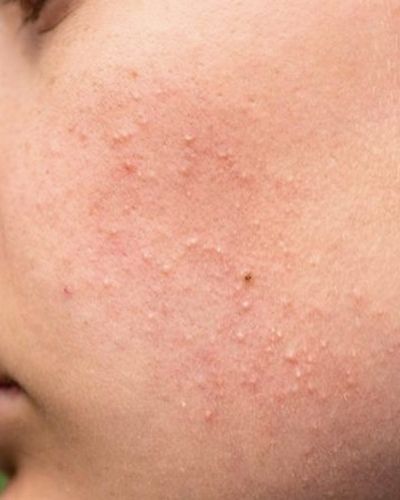
Accutane is the brand name for the medication known as isotretinoin, an oral medication used to treat severe acne.
Accutane works by inhibiting the function of the oil-producing glands and reducing the gland’s size.
Once the gland’s size is reduced, the gland will then produce less oil.
Since excess oil is essentially food for the acne-causing bacteria that live on the skin, lack of it will cause the bacteria to become starved, thus minimizing proliferation and eventually minimizing acne, too.
Accutane is a very effective medication; however, it’s known to come with some unpleasant side effects, including excessive dryness, peeling, irritation, and sun sensitivity.
While Accutane can be very efficient in getting rid of closed comedones, this type of acne is considered mild and non-inflammatory; therefore, gentler treatments usually get the job done without the need for such an intense medication.
However, if you are already prescribed Accutane for severe acne, you will likely see a reduction in closed comedones as you continue taking the medication.
Alternative Treatments for Clearing up Closed Comedones
Since closed comedones occur when a pore becomes blocked with sebum and skin cells, the best treatments for clearing them up are products that contain exfoliating acids that will work to unclog pores and topical retinoids that would increase cellular turnover.
Here are the best ingredients for clearing up closed comedones:
Salicylic Acid
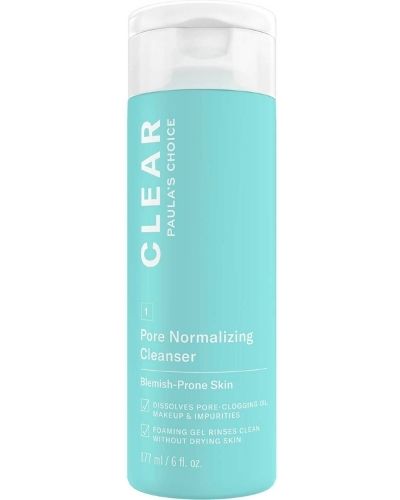
Best salicylic acid: Paula’s Choice – CLEAR Anti Redness Exfoliating Solution.
Salicylic acid is a basic and straightforward ingredient that can help address several skin concerns with regular use.
Salicylic acid is a beta-hydroxy acid (BHA) and an oil-soluble component that can cut through the superficial skin oil and travel deeper into the pores, where it will dissolve the gunk made up of dead skin cells, white blood cells, oil, and other cellular debris, that’s causing the pore to clog.
This will, in turn, allow for our natural oil to flow freely out of the pores instead of remaining stuck inside and causing issues such as blackheads, closed comedones, and cystic acne.
Salicylic acid is truly an amazing ingredient; however, you have to continue using it to continue seeing results as your skin is likely to come back to the same old if you stop using it for a longer period of time.
Mandelic Acid
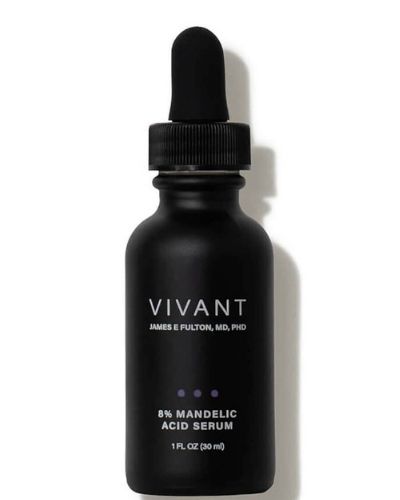
Best mandelic acid: Vivant – 8% Mandelic 3-in-1 Serum.
Mandelic acid is an alpha hydroxy acid (AHA) used to exfoliate the skin and address skin issues such as acne, hyperpigmentation, sun damage, and visible signs of aging.
It’s one of the mildest AHAs, making it suitable for sensitive skin, but it also has the ability to work inside the pore and not just on the surface of the skin.
This means that mandelic acid won’t only eliminate the superficial issue of closed comedones but will actually address their cause which starts inside the pore.
Lactic Acid
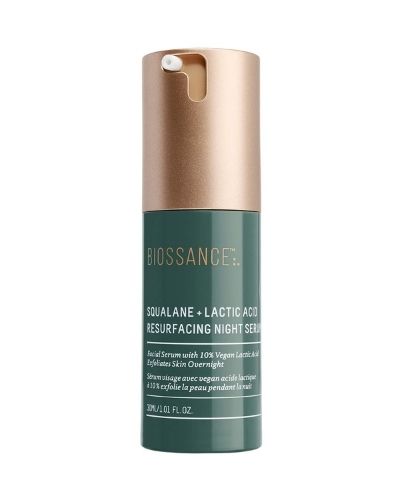
Best lactic acid: Biossance – Squalane + 10% Lactic Acid Overnight Serum.
Lactic acid is an exfoliating acid that belongs to alpha-hydroxy acids (AHAs).
This ingredient is derived from sour milk or sugar-rich foods, and it’s a water-soluble substance that possesses larger molecules, making it slightly different than other AHAs, for example, glycolic acid.
Due to its large molecules, lactic acid won’t penetrate deeper into the skin and will instead work on the surface, which means it will provide lighter exfoliation, making it more suitable for sensitive skins and those dealing with closed comedones.
Lactic acid is milder than other AHAs, and it can also be used alongside other actives as it is usually very well tolerated by all skin types.
Some benefits of using lactic acid include smoother and more uniform complexion, improved hyperpigmentation, evened-out skin tone, refined texture, and healthy and glowing skin.
Topical Retinoids
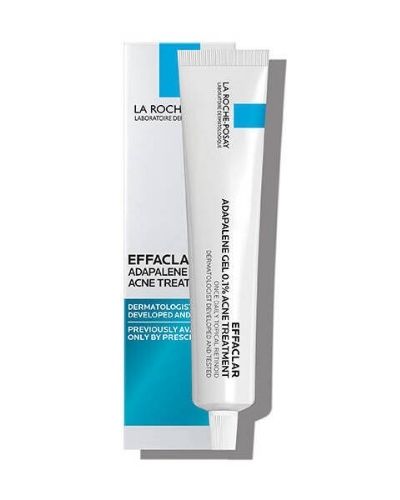
Best retinoid for sensitive, acne-prone skin: La Roche Posay – Adapalene 0.1%.
Topical retinoids or vitamin A derivatives are a family of powerful antioxidants that can help get rid of skin concerns such as premature signs of aging, sun damage, uneven texture, and even moderate to severe acne (depending on the strength of the product you are using.)
Retinoids increase cellular turnover, which helps normalize the skin cell function and decreases the buildup of dead skin cells, which is the case when it comes to closed comedones.
This will lead to a clearer, brighter, and more uniform complexion.
Retinol has also been found to reduce post-inflammatory hyperpigmentation and post-inflammatory redness, as well as pitted scarring left from severe acne, which is something no other ingredient does.
Best Professional Treatments for Clearing up Closed Comedones
If you would rather invest your money in a professional treatment instead of trying your luck with over-the-counter products that might or might not work for you, here are the best professional treatments for clearing up closed comedones:
Chemical Peels
Chemical peels are one of the most popular and effective professional treatments for closed comedones.
A chemical peel involves applying some type of acid solution to the skin that causes the outermost layers of dead skin cells to peel off and reveal a clearer and brighter layer of skin from underneath.
Since professional chemical peels are much stronger than over-the-counter exfoliating toners or serums, these will likely get rid of closed comedones after only one or two treatments.
Microdermabrasion
Microdermabrasion is sometimes referred to as “skin resurfacing.” And that’s because it literally changes the surface of the skin.
Used on everything from fine lines to closed comedones, this procedure uses tiny crystals to remove the surface layer of the skin.
Getting rid of that top layer of skin helps to unclog your pores and get rid of closed comedones.

My name is Simone and I am a certified skin specialist. I created this website to teach my readers how to take great care of their skin and I also like to occasionally share my honest opinions on skincare products I’ve tried. You can learn more about me here.
